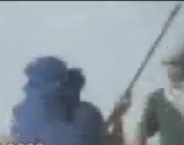The Israeli army has found a novel way of expressing its “impartiality” in the conflict between illegal settlers, Palestinians and protestors – it passes the activists’ internal mailings on to the settlers. Ta’ayush activist Anat Rosenwaks reports
 We in the Arab-Jewish Partnership Ta’ayush (http://www.taayush.org) knew that Israeli army works with the security guards of the settlements, so weren’t too surprised to learn that they brief them in advance. But this time the method was original. Our weekly mailings – calling on activists to accompany the farmers and including the meeting place and details of the organisers – were simply forwarded to the security guards. How easy! A ready-made message with all relevant information in it.
We in the Arab-Jewish Partnership Ta’ayush (http://www.taayush.org) knew that Israeli army works with the security guards of the settlements, so weren’t too surprised to learn that they brief them in advance. But this time the method was original. Our weekly mailings – calling on activists to accompany the farmers and including the meeting place and details of the organisers – were simply forwarded to the security guards. How easy! A ready-made message with all relevant information in it.
Asked to comment, the army spokesman said: “The army works in co-operation with the security guards in order to ensure the safety of the citizens of ‘Judea and Samaria’. The information forwarded to the security guards, was meant to alert them to situations which can cause a clash [between settlers and Palestinians or activists, A.R] so they will be prepared”. (Zman Yerushalaim newspaper, 26 November 2010).
This is just one of many examples of the well-established collaboration between the Israeli army and the settlers. No one any longer tries to hide the close relationship between them. Under the guise of preventing “disorder” both work to the same end: taking over more and more Palestinian land and trying to expel the Palestinians from South Hebron, allowing the scattered Jewish settlements to achieve a territorial contiguity.
This area is very attractive to the Israelis; a large area with a sparse population close to the green line – one that could easily be annexed to Israel in any future agreement. The settlers in reality do the dirty work for the army and civil administration, allowing them to appear concerned for the welfare of the Palestinians.
The South Hebron Palestinians belong to one of the poorest communities in the West Bank. Most of them still live in caves or temporary housing, with no running water or electricity, trying to make a living out of their lands and flocks. Permanent harassment by violent settlers and discriminatory policies by the Israeli authorities make life increasingly difficult. Some of the villagers have been deported from their lands a number of times, accused of illegal building or living in a military fire zone.
The farmers have huge difficulties keeping their lands, especially those who are near settlements or outposts. They often get attacked violently. They can’t go too close to the settlements because the area around them is defined as a special security zone so valuable agricultural acres are out of bounds. The farmers are trying to keep the rest of their fields. But if they don’t cultivate the land they lose their rights to it after a few years – and the settlers are waiting to take it over.
Settlement security guards play a major role in this game. They abuse their authority in a cynical way, with the silent approval of the army.
What usually happens when the Palestinian farmers (now generally escorted by activists because of the harassment they suffer) approach these lands is that after a few minutes the settlement’s security guard appears. He tries to make the Palestinians leave by threatening them, sometimes verbally sometimes violently – for example, shooting in the air, or trying to steal sheep. Sometimes Palestinians are detained, accused of entering the settlement’s territory, although there is usually no fence and no way of knowing whether this is in fact the case.
Alternatively, the settlers call in the army. Although this is private Palestinian land, the settlers claim it is disputed, or that the Palestinians are a security threat. The army declares the area a “closed military zone” and everyone has to leave. The Palestinians have to show documents to prove they own the land. Even if they have valid documents with them, it is very likely that the same scenario will take place next time. The soldiers readily declare a closed military zone claiming there is a danger of a clash, and the settlers ensure this is a self-fulfilling prophecy.
Needless to say, when Palestinians are attacked by settlers the security guards are not around, and if they are, they don’t call the army.
_________
Ta’ayush (“living together” in Arabic), is an Arab-Jewish grassroots movement founded at the end of 2000, after the start of the second Intifada, in order fight for equal rights for the Palestinian citizens of Israel and to strive non-violently to end the Israeli occupation in the west bank.
Ta’ayush has been involved in the South Hebron area since 2001, building solidarity with the Palestinians of the region , joining in the struggles to prevent expulsions from their villages, and resisting the ongoing harassment of the Israeli authorities and settlers.
The circulation of Ta’ayush internal mail between the army and the security guards now ensures they won’t miss any of our activities.
Anat Rosenwaks has been a Ta’ayush activist since 2001.
This article may be reproduced on condition that JNews is cited as its source.

This work is licensed under a Creative Commons Attribution-Noncommercial-Share Alike 3.0 Unported License.




